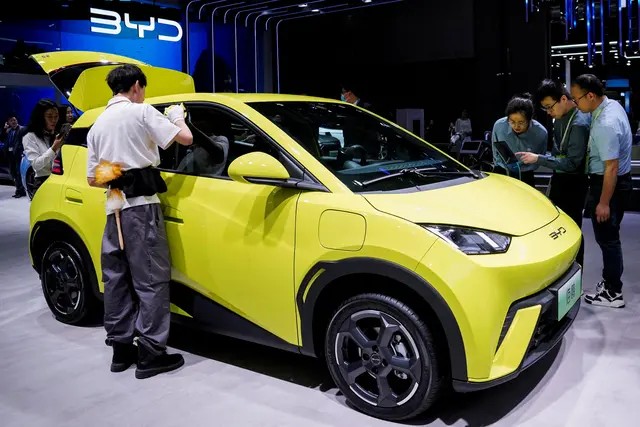After a record breaking year of global electric car sales in 2022, Chinese car manufacturer BYD has overtaken Tesla as the world's leading producer of EVs after selling 1.85 million units last year, according to a new report by The International Energy Agency (IEA).
That figure includes combined sales of battery and plug-in hybrid EVs. If sales of hybrid cars are removed, Tesla still remains the biggest seller of battery powered EVs worldwide, but that could change as sales of electric vehicles continue to surge in China.
In 2022, 10 million EVs were sold globally and that number is expected to jump to 14 million this year - a rise of 35 percent.
Much of that growth is likely to occur in China, the U.S. and Europe, where the overwhelming majority of electric car sales occurred last year. China is currently the front-runner, with 60 percent of global electric car sales taking place there in 2022.
The increase in sales of electric cars and other vehicles, such as buses and trucks, are likely to have a big impact on the energy sector. The IEA says that EVs could avoid the need for five million barrels of oil per day by 2030.
IEA Executive Director Fatih Birol said, "Electric vehicles are one of the driving forces in the new global energy economy that is rapidly emerging – and they are bringing about a historic transformation of the car manufacturing industry worldwide.
"The trends we are witnessing have significant implications for global oil demand," Birol believes. "The internal combustion engine has gone unrivaled for over a century, but electric vehicles are changing the status quo. By 2030, they will avoid the need for at least five million barrels a day of oil. Cars are just the beginning, electric buses and trucks will follow."
Despite a concentration of electric car sales and manufacturing in only a few big markets, there are promising signs in other regions. Electric car sales more than tripled in India and Indonesia last year, albeit from a low base, and they more than doubled in Thailand. The share of electric cars in total sales rose to 3 percent in Thailand, and to 1.5 percent in India and Indonesia.
A combination of effective policies and private sector investment is likely to increase these shares in the future. In India, the government's $3.2 billion incentive program, which has attracted investments worth $8.3 billion, is expected to increasing battery manufacturing and EV rollout substantially in the coming years.
In emerging and developing economies, the most dynamic area of electric mobility is two- or three-wheel vehicles, which outnumber cars. For example, over half of India's three-wheeler registrations in 2022 were electric, demonstrating their growing popularity. In many developing economies, two-or three-wheelers offer an affordable way to get access to mobility, meaning their electrification is important to support sustainable development.
(CGTN)
 简体中文
简体中文

